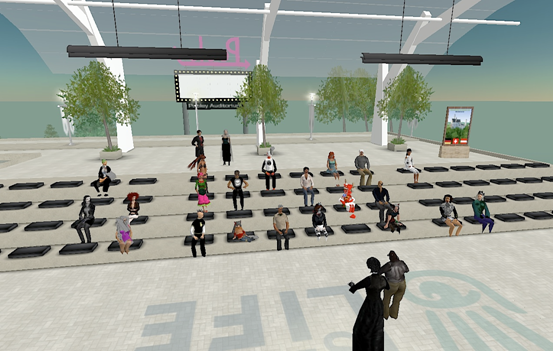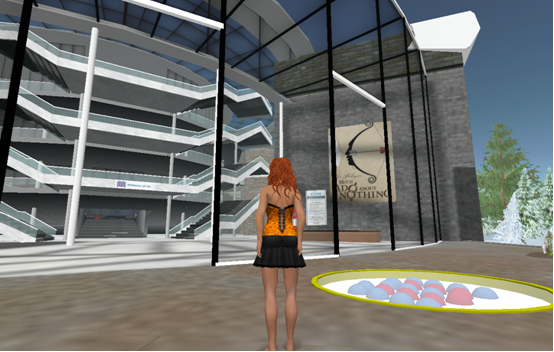Cardenio: The Intercultural Experience
Second Life (SL) is a virtual 3-D world, which millions of people across the world are engaged in helping to create. SL offers scope for social networking and also provides a rich environment in which to explore, create, do business, teach and learn. SL users, known as residents, interact in this world using avatars and can build there too. In-world development includes micro-environments such as parks, gardens, shops, cityscapes, theatres, an equestrian centre and the ballet, as well as particular places such as the London Eye, New York, Reuters and the New Globe Theatre designed by Norman Foster and Partners.
http://www.newglobe.org/
Figure 1 - Linden Labs meeting

Figure 2 - New Globe Theatre

Islands can be bought or land rented in SL if residents wish to build. Some islands have been created specifically for educational use and many educators are testing the potential of SL for teaching and learning in different disciplines. Whilst simple exploration of SL can be one of the most rewarding aspects of the environment for educators, they are also creating and maintaining secure places for students' informal learning to occur. A key benefit of SL is that residents are able to interact in a visual, auditory and kinaesthetic way within a 3D environment.
Second Life offers an instant opportunity to interact with other residents based around the world, and there are endless possibilities to practise languages and explore intercultural ideas together. The in-world experience is immersive, and approximates real life to a closer degree than any other VLE; it can provide ideal opportunities for language learning, linguistics and area studies.
The internationalisation of learning has been the focus of a publication by the HE Academy, (Academy Exchange, Winter 2006). In contemporary education and society, it is evident that there is a need for greater intercultural communication. Second Life offers an invaluable opportunity to investigate the intercultural experience through areas of culture, identity, community and belonging. In addition, it enables exploration and research of these issues in an environment developed outside the traditional boundaries of the formal education system.
The internationalisation of learning has been the focus of a recent publication by the HE Academy, (Academy Exchange, Winter 2006). In contemporary education and society, it is evident that there is a need for greater intercultural communication. Second Life offers an invaluable opportunity to investigate the intercultural experience through areas of culture, identity, community and belonging. In addition, it enables exploration and research of these issues in an environment developed outside the traditional boundaries of the formal education system.
The Cardenio Project
In 2007, the Cardenio project set out to explore the potential of SL for enhancing the study of language learning and area studies. The project sought to identify precisely the benefits for participants engaged in pursuing a shared learning interest, and set of goals.
Aims and objectives
- To investigate how a group of SL residents, with a shared interest, interact with and optimise the 3D online environment to achieve their collaborative aims
- To identify from the residents' perspective what the specific affordances of the Second Life MUVE (Multi User Virtual Environment) might be in terms of their goals
- To observe the potential of the MUVE for the acquisition of higher-level skills including those of negotiation, conflict resolution, intercultural, personal and creative skills. (Hudson, 2006)
The project set out to do this by:
- bringing together new SL users (language teachers and educators) and experienced SL residents to form a small self-supporting project community;
- investigating notions of culture and personal identity in SL through a series of in-world search tasks and blog discussions;
- exploring the potential of SL for informal learning and more specifically as a platform for specific language learning and teaching purposes.
The project community
Participants in the project consisted of volunteers from two different communities and representing a range of nationalities: professional language teachers and educators with a specific interest in exploring the potential of SL for intercultural exchange, language teaching and learning, and a community of experienced SL residents with diverse interests in aspects of the project.
Outcomes
- A range of different and interesting perceptions of culture and personal identity were reflected by SL search tasks and blog postings
- Bonds formed between group members, and contact through the in-world community looks set to continue
- Modern Language teachers produced proposals for using SL to support students' language learning and for acculturation purposes
The Cardenio Report
Ann Jeffery, Julie Watson and Cindy Crawford (2008)
The full Cardenio Report can be downloaded from the Higher Education Academy Language Linguistics and Area Studies Subject Centre website:
http://www.llas.ac.uk/resourcedownloads/3001/jeffery_report.pdf
References
Watson, J and Jeffery, A. (2008) Crossing Cultures and MUVEing Worlds: Exploring aspects of cultural identity in Second Life. Presentation given at 2008 E-learning Symposium hosted by HEA Subject Centre in Languages, Linguistics and Area Studies. Downloadable from
http://www.llas.ac.uk/events/llaseventarchiveitem.aspx?resourceid=2876&filename=e-Symp2.ppt
Borthwick, K. and Jeffery, A., 2006, Piccolo Mondo: Virtual worlds for language learning: a look at Second Life, E-learning conference: February 2007.
http://www.llas.ac.uk/events/llaseventarchiveitem.aspx?resourceid=2654
Hudson, Richard, 2006, How can key skills 'sell' Linguistics to students and employers? Guide to Good Practice for learning and teaching in Language, Linguistics and Area Studies.
http://www.llas.ac.uk/resources/goodpractice.aspx?resourceid=2568
Academy Exchange, Supporting the student learning experience, Winter 2006, Issue 5, The Higher Education Academy

